Ep24: Know Thyself up the Ladder of Prayer
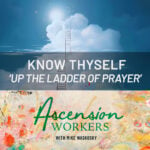
Ascension Workers
Ep24: Know Thyself up the Ladder of Prayer
/
RSS Feed
In this episode, Mike explores the concept of self-enquiry, emphasizing the layers of accumulated beliefs and teachings that shape who we perceive ourselves to be. He discusses the process of questioning and releasing these identities to achieve spiritual growth, drawing on teachings from Eastern philosophies, Christianity, and A Course in Miracles. The episode includes a reading of “The Ladder of Prayer” from ACIM, discussing the nature of prayer and forgiveness, suggesting that understanding oneself and accepting one’s identity are crucial steps toward spiritual unity and humility.
Next Episode: Ep25: Distractions & Purpose
WEBVTT For Hello, welcome to another episode by Social Workers. I'm Mike Wazowski, and I'll be talking about the subject of knowing the self, know, accepting yourself, but primarily starting with understanding what it is that you see as yourself. There's so many layers to our identity that we, that we have accumulated since childhood and, and that are taught to us some that we form on our own. And the release of the layers of identity that we are attached to seems to be a central part of our spiritual work. And I think that the, you know, the release from things happens when we shine the light on those things that need to be released. And a starting point for releasing things could be asking ourselves what it is that we are currently seeking and who, who is it that is needing that? What aspect of ourselves is needing that, which we're, we're still attached to. And there are a few different ways which we can go about this process of, of self-inquiry, of understanding what it is that we're still attached to and whether or not that's holding us back. Obviously, I've, I've spoken about Ramen Maharshi as being a, a central example in the, the Eastern teachings where he, he wasn't really following any school or discipline, which was kind of rare for, for gurus in India or not that he would necessarily try to call himself a guru. Um, but, but the, the teaching that he gave was simply ask, who am I? Just ask the question, who am I? And what, where is that leading you in your, in your inner perceptions? And I could give you a minute now, just ask, who am I? And you know, obviously there's, there's things that can come up with, we have a, a name, we have a, a concept of our body and the roles that we have with our body that's, that's the easiest functional of, one would call this the outer dimensions. The dimensions of space time are the dimensions of function where we have the, the characters on the screen that we can learn from and learn through. And obviously our body represents one kind of character that we're learning from and learning through. And so it's pretty easy when we say, who, who am I to say, well, I, I seem to be connected to this body at a, a very minimum. That's not to say that I'm not something far beyond the body, something that's inhabiting the body or something that created the body on a deeper level that I'm not, the body is not apparently, uh, in touch with, in its memory banks. I don't remember choosing, at least it's a part of this body, this body's preferences to not be very aware of why this incarnation was chosen or on what level this lifetime was created with a form of intelligence that we are somehow connected to. If that's the God consciousness that created everything, whether or not we're connected to that, if that's could be called Christ consciousness or Christ's body. Are, are we, are we limbs of the body of Christ? This is a Christian analogy of perceiving things that, you know, in John chapter 15, Jesus spoke about, uh, the, the perception of I am the vine and you are the branches. We are, we're, we're grafted in, we're connected into some larger tree of consciousness in that, in that metaphor. And I think that's, and you know, a, a, a, a way that the law of wood describes the nature of the logos as, as a, as a, as a principle that, you know, as a Greek word that was pulled in by the author of the Book of John, the logos being seen as a, a principle, which could be the word, the vibrational resonance of, of the creator's mind seeking to become form or express itself in some form. And the logos could be seen as love itself, the love that inspired all creation. And the logos was, and the book of John was connected to the concept of the incarnation of Jesus. That Jesus is the, is this example of this, this ancient principle of the logos becoming flesh, becoming manifest. Um, but the, the deeper teaching here is that there is not a, a single separated identity when you're dealing with the logos. You're dealing with the logos and sub sub logos, sub logos. There's, there's connections between the individuals, the law of one teachings. There's connections between individuals as the sub, sub logos as portions of explorations of what identity can be that the, the logos initiated that, that, that series of explorations through the, the choice of love, the choice of knowing the self, the focus of love into, um, digestible energetic forms. The intelligent infinity coming from the int inte intelligent energy coming out of the intelligent infinity, the kinetic coming from the potential energy of the, of the creative principles of, of the mind of God. You could say, um, these are some very abstract concepts. I could take, try to take it back a little bit to the personal level, um, but I thought it'd be fun to share a little bit of a reading. Um, I, I feel like a lot of people have Christianity as the roots, and a lot of people don't even know about the, uh, the book that was called The Course of Miracles, which was some of the best channeling I've ever seen. But it's, it was inner dictation through a woman named Helen Shaman in like the, the late sixties. And it was published in the seventies, this book that was called The Course in Miracles. And there are many versions of it. And, um, the version that, that I want to share with people is called the Tex. This is the, the earliest notes. This is the, the version that was fought over to see if people could, people could actually get the original notes. And the original versions of the material were more extensive and they were more personal. They had a lot of teachings about sex, which was edited out from the official publications that people know about. But I think that actually brings legitimacy and authenticity to understanding this, this channel, the source of this information was, uh, was really trying to get to the, the meat of what people need to understand. And, and of course, the humans who are involved try to edit it down and make it more palatable for a spiritual seeking audience. They don't wanna have controversy around it. Not that there was anything controversial. Um, it's controversial in the context of it's contradicting the, the intense demands of Christian theology that there be a sense of separation between us and God. It certainly tried to break down those walls, uh, and became controversial for that reason. Um, but a lot of people just see as a separate category and not a Christian text. But anyway, there, there was a publication that was a part of the, the series of publications. It was called the, the Song of Prayer. And the Song of Prayer, um, had a fascinating section, which I feel illuminates the, the role of identity in the way in which we are praying, praying. I feel like the way we view prayer seems to be, uh, a way of understanding where we're at energetically in terms of where we're coming from, when we see ourselves as joined with the creator in the choice of creation that we have received. The con the connection between the mind of God and the, the, and the creation is, is total, it's absolute. There's no separation between the will of God and the creation as we see it. If you can believe that all of free will if connected through one tree of consciousness, back to one root, that is the source of all, of all consciousness, the source of choice for all expression and prayer is one way in which we understand the position upon the ladder that we're taking or that, or the tree, uh, going back to the source of, of, of all reasons for manifestation, which is connected to our level of choice and how we see ourselves. But I, but I thought this is well illuminating in, in the section called the Latter of Prayer. This is just, just a couple pages in to the Song of Prayer, a pamphlet that was originally published. Prayer has no beginning and no end. It is a part of life, but it does change in form and grows with learning until it reaches its formless state and fuses into total communication with God. Prayer fuses into total communication with God, and it's asking form and need not, and often does not make appeal to God. Oh, and I should clarify, this is the source that was claiming to be speaking through Helen Shaman claimed to be Jesus. So this, some people believe that this is Jesus making corrections to things that were in the, the misinterpretations of, of the theology of, of the New Testament. And it's asking form and the asking form of prayer that need not, and often does not make appeal to God or even involve belief in him at that level of asking Prayer is merely wanting out of a sense of scarcity and lack. So this is saying that there is a form of prayer which does not even need to require belief in God. That's just putting out a sense of lack into the universe. I've heard some people say that worrying is a form of prayer. You're almost asking for what you don't want when you're, when you're stuck in a state of worry. Um, but at this first level, prayer is merely wanting out of a sense of scarcity and lack the prayer or asking out of need, always involves feelings of weakness and inadequacy, and could never be made by a son of God who knows who he is or a child of God. You could say no one then who is sure of his identity could pray in this form. No one who is sure of his identity as a child of God could pray in this form of asking out of a sense of lack. Yet it is also true that no one who is uncertain of his identity could avoid praying in this way. And prayer is as continual as life. Everyone prays without ceasing. That's a profound revelation that they're trying to get across here. Everyone prays without ceasing. Prayer is as continual as life ask. And you have received for you have established what it is you want ask, and you have received for you have established what it is that you want. It is also possible to reach a higher form of asking out of need. This is continuing on the latter idea. Uh, it is also possible to reach a higher form of asking out of need For in this world, prayer must be used for reparation, and so it must entail levels of learning. Here, the asking may be addressed to God and honest belief, though not yet with understanding. A vague and usually unstable sense of identification has generally been reached, but it tends to be blurred by a deep rooted sense of sin. So here they're talking about unstable identification as a child of God, blurred by a sense of sin. It is possible at this level to continue to ask for things of this world in various forms, but it is also possible to ask for qualities such as honesty or goodness, and particularly for forgiveness, for the many sources of guilt that inevitably underlie any prayer of need without guilt, there is no scarcity. The sinless have no needs, and there's a lot to unpack right there, but we're, we're moving now from asking for the finite to asking for that which is infinite, which is the teaching of the law of one that inevitably with the transformation of the spirit, we're moving towards seeing in terms of this finite form, in this material world, to transmuting what is here, to seeing it in terms of what is of the infinite, the heavenly nature, the divine nature. When we can perceive that that which is divine around us, we are beginning to transmute and transform our reality through the spiritual dimensions of our being. So it is possible to ask for qualities such as honesty or goodness, which are more of an infinite nature. Particularly we could ask for forgiveness for the many sources of guilt that inevitably underlie any prayer of need. Where is the sense of need coming from? Where is the feeling of something being out of place coming from, and what forgiveness could become invoked through the process of prayer, asking for that form of forgiveness? If we see it as outside of ourself or coming from within ourself, it's the same thing. The forgiveness is necessary to heal this sense of attachment to that which is out of seemingly out of alignment without guilt, there is no scarcity. The sinless have no needs at this level. Also comes that curious contradiction in terms known as praying for one's enemies. The contradiction lies not in the actual words, but in the way they are usually interpreted. While you believe you have enemies, you have limited prayer to the laws of this world and limited your ability to receive and accept to the same narrow margins. And yet, if you have enemies, you have need of prayer and great need too. What does the phrase really mean? Pray for yourself. What does the phrase praying for one's enemies really mean? Pray for yourself that you may not seek to imprison Christ and thereby lose recognition of your own identity. Pray for yourself that you may not seek to imprison Christ and thereby lose the recognition of your own identity. They're talking about looking at others and seeing Christ bet traitor to no one. Or you'll be treacherous to yourself. An enemy is the symbol for an imprisoned Christ. And who could he be? Accept yourself the prayer for enemies thus becomes a prayer for your own freedom. Now it is no longer a a contradiction in terms. Rather, it is a statement of the unity of Christ and a recognition of his sinlessness. Now it has become holy for it acknowledges the son of God as he was created. Let it never be forgotten. That prayer at any level is always for yourself. If you unite with anyone in prayer, you make him part of you. The enemy is you, as is the Christ. Before it can come, can become holy. Then prayer becomes a choice. You do not choose for another, you can but choose for yourself. Pray truly for your enemies, then for herein lies your own salvation. Forgive them for your sins and you'll be forgiven. Indeed, forgiving other people for our sins is pretty profound because it speaks a lot to the nature of mirroring that we're experiencing. The the way in which that which shows up in our life is the mirror of the thing that we most needed to work on, most needed to look at and heal and accept in ourselves. It's usually very often it'll come in like an inverted form because we weren't looking at that other side of the equation. When, when somebody seems to trigger us, it's because of something inside of us that could be triggered that we needed to see through this. A mirroring aspect. So when you forgive others for your sins, you'll be forgiven. Indeed, prayer is a ladder reaching up to heaven at the top there is a transformation, much like your own for prayer is a part of you. The things of earth are left behind all unremembered. There is no asking for, there is no lack identity in Christ is fully recognized as set forever. Beyond all change and incorruptible the light no longer flickers and will never go out. Delight of identity, knowing the self is Christ. Now without needs of any kind and clad forever and pure sinlessness, which is the gift of God to you, his son or daughter, prayer can again become what it was meant to be without needs of any kind. Now prayer can become what it was meant to be. For now, it rises as a song of thanks to your creator, sung without words or thoughts or vain desires, un needful now of anything at all. So it extends as it was meant to do. And for this giving, God himself gives thanks. This is why they call it the Song of Prayer. God is the goal of every prayer, giving it timelessness instead of end, nor has it a beginning because the goal has never changed. Prayer in its earlier forms is an illusion because there is no need for a ladder to reach what one has never left yet. Prayer is part of forgiveness as long as forgiveness itself and illusion remains unattained, prayer is tied up with learning until the goal of learning has been reached, and then all things will be transformed together and returned unblemished into the mind of God. Being beyond learning, the state cannot be described. This is what law of one might call intelligent infinity. Being beyond learning, the state cannot be described. The stage is necessary to its attainment. However, need to be understood if peace is to be restored to the son of God who lives now with the illusion of death and the fear of God. So that was just one little section of, uh, the latter of prayer inside the song of prayer. Inside what I was reading from was the original. This was published much later, but it was the earliest edition possible of the, the notes and all the initial writings of Helen Shaman, um, which had a lot more material, similar to book five of the law of one series where they edited out the pub, the the personal material and decided later to publish some of it because it was so useful to people. And this one has, you know, all the notes, all the original discussions, which were kind of profound because, you know, as Helen shaman would go through things, she would receive very direct feedback and guidance from the source, which claimed to be Jesus. And it seemed like that was a part of her own journey to become ready to be a pure channel. Although she wasn't doing trance channeling like Karl records, she was just doing, hearing a voice, being told to write it down and being told to write down any time there's a note or a clarification, just keep writing it down faithfully, keep on writing it down. And it was just such a beautiful book. Um, but I thought that the, you know, the principles of, of understanding who are we? How do we view ourselves, where do we reach to when we ask who am I? You know, we have, we have a lot of programming that makes us feel very separate, makes us feel very isolated from that, which is around us, the people around us, the manifestations of our life, they feel separated from the innermost parts of our identity. But if you think about the, the very concept of prayer, it's like on what level are we using our conscious mind to interact with our unconscious connections to the rest of the world through, um, you could say that there's a psychic connection that we all share. Um, but really it's, it's like, it's the roots of consciousness. Dig down into the heart of all manifestation because where, where, where is your consciousness really coming from? From? Does it really come because you were born into a body? And does it, does it come because you are a soul? Does consciousness exist simply because you are the separated soul? But what is the soul connected to? You know, I I think if you, if you start asking enough questions about identity and and where your, where your consciousness and your thoughts are, you'll see that they're actually shared. You know, we're, we're sharing in a lot of thoughts that are, uh, com community based, uh, uh, racial thoughts, social, uh, ways of thinking about the world, thinking about identity and thinking about relationships and roles. You know, we start to move a little bit beyond ourself when we say I am taking on the role of a parent. And then we end up plugging into everything that we thought about parenting from when our, from we were children, and our parents were showing us what it meant to be a parent and everything that we had accumulated around what is a good parent? What is a parent's job? A parent can't possibly just drop, uh, a young child en environment. The child will just tear, uh, you know, break apart in because the child needs instruction. And there's a role that reaches beyond the individual identity of an of a person. And it goes into, uh, the identity of the child and the responsibilities that are shared there. And, you know, this is also a, a great way of looking at the, the nature of, of God as the role of that aspect of ourself, which has the parental view, which knows this is the way the child needs to go to continue down the path of learning certain lessons to become more capable of being helpful and radiant to others who are seeking to return to a higher source of awareness, a higher source of a connection to God, of, uh, understanding of Christ. If the, if the child is being placed on that, on that path, through the careful guidance of the parent, the child will benefit from, uh, surrendering to some degree, to the will of the Father, to the will of the parents. And appreciate that there is a, a level of awareness which can be tapped into where identifying as a family unit can potentially, uh, accelerate progress. Uh, and of course there's, there's many transcendent, transcendental or, um, transcendent kinds of experiences that are possible in, uh, experiences of group prayer and group worship where we lose our sense of separated identity and we become a part of the, the, the consciousness which is working through us. And we can feel that there is a higher nature to our being that is often veiled from us, veiled from our awareness when we're in our normal waking state of consciousness. Uh, and we're not thinking as much in terms of the divine will operating through our, our incarnations and through our bodies. Um, but piece by piece we know ourselves and piece by piece we let go when we learn to forgive and accept and heal. As I started out with the discussion, uh, the law of one books said, the heart of the discipline, discipline of the personality is threefold. One, know yourself. Two, accept yourself. Three, become the creator. The third step becoming the creator is that which when accomplished renders one the most humble servant of all transparent in personality and completely able to know and accept other selves. The personality is no longer opaque. The personality is transparent. When we've fully known that which seemed to be separate and accepted it and allowed it to be merged back in to the transparency of identity that the Christ consciousness is working on through all of us, being completely able to know and accept other selves with no blockages to the, the awareness of unity with other selves, no blockages that would manifest as pride as we're becoming the most humble servants of all. As we seek to become the most humble servants, we're releasing ourselves from, uh, feelings of separateness and our identity, and we're honoring the creator and everyone, the Christ consciousness and everyone potentially working through everyone. Um, even though there may be appearance of a imprisoned Christ or a broken or unhealed Christ and others, as we have difficulty seeing Christ and others, we we can find more about how ourselves, how we ourselves are, are part of the process of releasing and forgiving the world for that which it believed it was, which it believed it was separate, it believed it could be broken apart from the, the deeper connectedness, the deeper body, and it can paint with the opaque lens, the stained glass window that prevents us from seeing clearly through to the creator, trying to, trying to work through these flawed personalities, seemingly flawed personalities. And it's just calling us back to the light, calling us back to the pure light, undifferentiated and, and completely full of love. Uh, through, through releasing the illusions of separate identity, the illusions of, of, uh, positive and negative attachments that we, that we form with our sense of self and sense of, uh, why we are unique or special or different. All those things can be released and, and given over to the, the, the higher self, the higher aspect of ourselves or the Holy Spirit or the holy nature of perception. I do think this is connected to what the law of One Books talk about with the energy centers and the lenses of perception that occur through each of the different levels of perception, the survival, seeing in terms of personal identity, seeing in terms of social relations, the way in which we relate to survival, the way in which we relate to views of our personal identity relating to views of others in social relations, and then relating to unconditional love. When we get to the heart center, all these areas are areas of needing to understand ourselves, to be able to accept ourselves. And, but where there is a lack of acceptance, a lack of forgiveness, we have the karma, we have the repeated cycles of, uh, patterns in our lives that, that just keep on coming at us until we learn, oh yeah, that's something I could be forgiving. I could be a little bit more forgiving there, I could be accepting that I could be allowing that to just be a part of a divine plan. And finding a balance that seems so out of balance by, by, by giving it over and not, not needing to control, not not needing control, is seen as the opposite of acceptance in this, in this sense, not needing to control anything and just accepting what is as perfect and wholly divine a part of the divine plan. And it's, it's hard, it's a hard process, but, but it's a step by step process. And that's why we have time. We have time every day to be given lessons, new opportunities for self-awareness, self-knowledge and healing. And that comes through others. It's the easiest way to see what we have to work on, is seeing others around us. Why are, why are they bringing us to the apparent relationships with them that we have the apparent mirroring that we're doing each each day gives different lessons. And it's a miraculous orchestration on a, a, a level that none of us can fully appreciate. That, that, that the universe has given us a curriculum, uh, uh, for, for working together towards healing and learning and growth that's happening through all the circumstances in our lives, with no exception, down to the finest detail that we get, that we, that we may choose to become distracted by or caught up on their symbols of the truth. Like a dream that has profound symbols for teaching on every level of the dream. The teachings are there, the potentials are there for greater understanding of that which needs to be understood, seen, accepted, and healed in ourself, and healed through awareness of ourself, through seeing ourself and others, through seeing Christ and others, and coming back into mourned total communion with the infinite consciousness that is the source of all consciousness. And thank you to Gregory Greg says, surrendering is key. Yep. That is the theme. That is the theme of, of, of, uh, self-awareness and self-acceptance, finding what it is that we can surrender. Alright, so thank you guys for listening to this. A little rant. I guess I, I went on and I'll open this up now and we can continue the discussions with the unrecorded portion of this.
People: Mike Waskosky
Topics: Inner Work, Religion, Self-Mastery, Spirituality


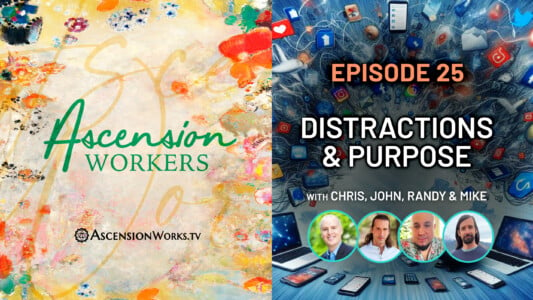
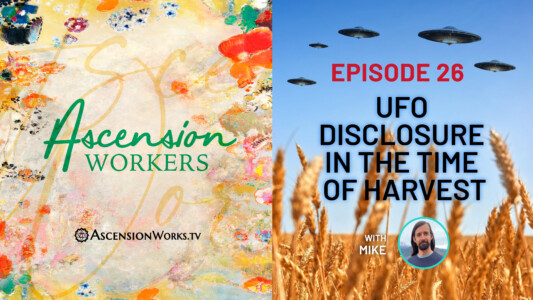
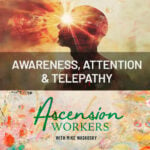
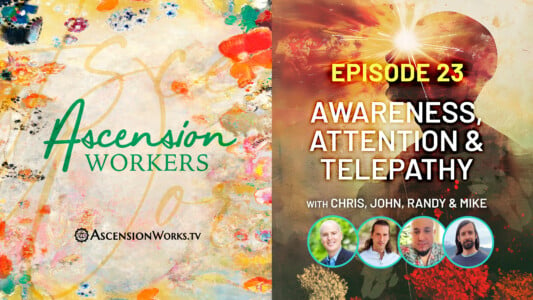

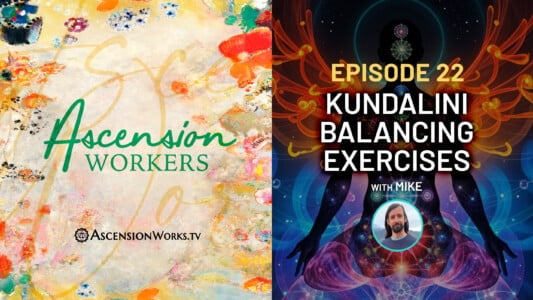



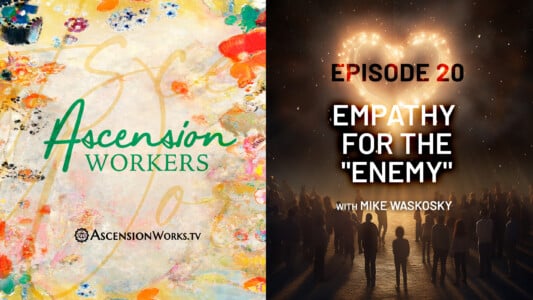
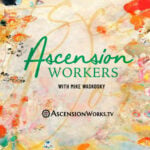
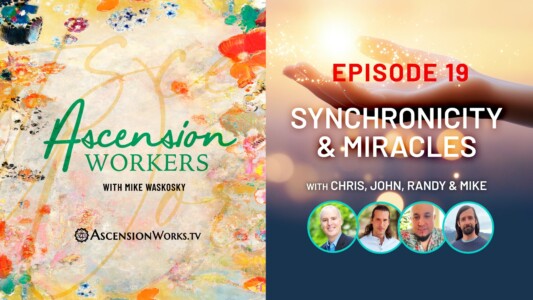

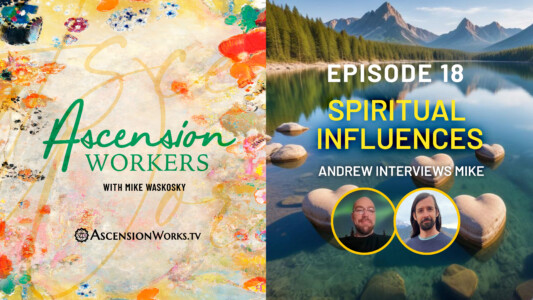


Responses